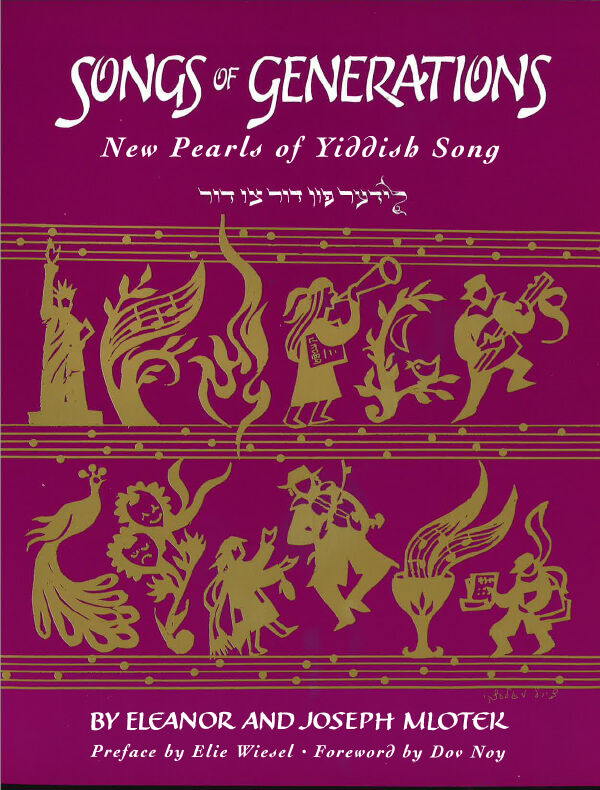The song appears twice in Shmerke Kaczerginski’s collection of ghetto and concentration camp songs without the melody. It was sung in the Bialystok region, Borki-Kamionka. It was also sung in Transnistria (between the Dnieper and Bug Rivers) where Jews from Romania, especially from Bessarabia and Bukovina were deported. The ghetto song was based on an earlier song that was sung during the Petlura pogroms in Bessarabia. That text was published in the YIVO Bleter in 1932. Clara Krasner, mother of Molly Freedman, recorded the song in response to our request, which her son-in-law Robert Freedman then submitted to us. The melody was transcribed by the compilers and thus is printed for the first time.

The sky is cloudy
not a ray of sunlight is seen.
All the streets are in chaos,
blood is streaming.
The houses of study
have outworn their value;
they made stables out of them
and horses put inside them.
Eykho how can it be?
Why don’t you speak up to the goy?
Where is your mercy, Father?
Look, God!
Take a look down from heaven
and glance at the Jews,
put out the fire
and let it be enough!
The holy books –
they are sweet as sugar;
they are tearing them into pieces
and throwing filth on them.
The dear little children
at their mothers’ breasts,
they are tearing them into pieces
and throwing filth on them.
We stand there and beg
there in Kamyank concentration camp,
Got have mercy,
and let us out of that place!
It is better to eat
a dry crust of bread,
than to die
the death of the camps.
*Eykho is the Jewish title of the book of Lamentations
Farvolknt der himl,
Keyn shtraln zet men nisht;
Es royshn ale gasn —
S’kapet mit blut.
Di botey-medroshim,
Ongevorn zeyer vert;
Men makht fun zey shtaln,
M’shtelt in zey arayn ferd.
Refrain:
Eykho — vi azoy?
Far vos shvaygstu dem goy?
Vu iz, tate, dayn rakhmones?
Re’ey ad!
Fun dem himl gib a kik (kuk),
Un oyf di yidn gib a blik,
Lesh shoyn op dos fayer
Un loz shoyn zayn genig! (genug)
Di heylike sforirn,
Zey zaynen tsuker-zis;
M’rayst fun zey shtiker
Un m’varft oyf dem mist.
Di kleyntshinke kinderlekh
Fun der mamas brist;
M’rayst fun zey shtiker
Un m’varft oyf dem mist.
Mir shteyen un betn
In kamyanker lager dort:
Got, hob rakhmones,
Un loz undz aroys fun dem ort!
Es iz beser tsu esn
A trukn shtikl broyt,
Vi eyder tsu shtarbn
Fun lagershn toyt.
פֿאַרװאָלקנט דער הימל,
קײן שטראַלן זעט מען נישט:
עס רױשן אַלע גאַסן —
ס׳קאַפּעט מיט בלוט.
די בתּי־מדרשים
אָנגעװאָרן זײער װערט:
מען מאַכט פֿון זײ שטאַלן,
מ׳שטעלט אין זײ אַרײַן פֿערד.
רעפֿרײן:
איכה — װי אַזױ?
פֿאַר װאָס שװײַגסטו דעם גױ?
װוּ איז, טאַטע, דײַן רחמונות:
ראה ד׳!
פֿון דעם הימל גיב אַ קוק
און אױף די ייִדן גיב אַ בליק,
לעש שױן אָפּ דאָס פֿײַער
און לאָז שױן זײַן גענוג!
די הײליקע ספֿרים —
זײ זײַנען צוקער־זיס:
מ׳רײַסט פֿון זײ שטיקער
און מ׳װאַרפֿט אױף דעם מיסט.
די קלײנטשינקע קינדערלעך
פֿון דער מאַמעס־בריסט,
מ׳רײַסט פֿון זײ שטיקער
און מ׳װאַרפֿט אױף דעם מיסט.
מיר שטײען און בעטן
אין קאַמיאָנקער לאַגער דאָרט:
גאָט, האָב רחמנות,
און לאָז אונדז אַרױס פֿון דעם אָרט!
עס איז בעסער צו עסן
אַ טרוקן שטיקל ברױט,
װי אײדער צו שטאַרבן
פֿון אַ לאַגערישן טױט.
Song Title: Eykho

The Songs of Generations: New Pearls of Yiddish Song anthology comprises songs that were either never printed before or appeared in rare and inaccessible publications — sometimes in different versions and without proper sources. Most of the songs in this book were submitted by readers of Chana and Yosl’s column “Perl fun der yidisher poezye” (Pearls of Yiddish Poetry) in the Yiddish newspaper Der Forverts (The Forward), initiated in October, 1970. Over 25 years, thousands of songs were collected in correspondence and on cassettes from readers throughout the world, and they represent a veritable national Yiddish song archive. Chana Mlotek, in her introduction, writes, “In the course of years the inquiries, contributions and enthusiasm of these readers have kept our own interest unflagging and have reinforced our dedication to this effort. And in recent years our participants have also been augmented by new readers from the former Soviet Russia, who receive our newspaper there or from newly-arrived immigrants in this country and Israel.”